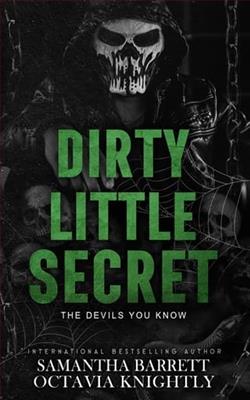Page 72 of Everything She Feared
Three months after Carrie and Willow left Tempe, a sedan pulled into the driveway of the Gardners’ home. A man and woman came to the front door. Grim-faced, they presented ID, confirming they were FBI agents.
“We have an update on your daughter’s case,” the woman said.
Ryan’s parents sent him upstairs to his room, but he sat at the banister where he listened and watched through the spindles.
The agents were invited into the kitchen. Ryan had a direct view from the banister and he watched as the female agent unzipped a leather portfolio bearing an FBI seal, then withdrew large photos, placing them on the table. The pictures showed, in large dramatic, crisp detail, a yellow actuator, a canister and a capped mouthpiece of an asthma inhaler. Ryan’s dad groaned and Ryan’s mother stifled a squeal. The agents said the prescription label on the canister held Carrie’s full name, her date of birth and other medical information, then showed it to his parents. Without speaking, their eyes carried their terrifying question to the agents.
“We’re certain this is Carrie’s inhaler,” the agent said. “It was found near Billings, Montana, in the residence of Herman and Magda Vryker.”
“Where’s Carrie?” Ryan’s mom’s voice sounded strange.
“We haven’t located her at this time,” the agent said.
“Who’re these people in Montana?” Ryan’s dad bristled.
The question went unanswered for what seemed like a long time.
“There’s little we can say because we have an ongoing investigation,” the agent said. “We can tell you that the Vrykers are facing charges in the recent assault of a woman in northern Idaho. Her case led us to the Vrykers and evidence linking them to the disappearances of several other people, including Carrie and Willow Walker.”
“Oh, my God!” Ryan’s mom said.
“What’re you saying?” Ryan’s dad asked. “Is Carrie dead?”
“We never give up hope,” the agent said, “but you must brace for the worst.”
And the worst came, weeks later when the agents returned.
Again they sat at the kitchen table where they told Ryan’s mom and dad that Magda Vryker had made a plea deal and confessed to investigators. She and her husband had murdered Carrie, Willow and five other people.
To this day Ryan maintained that the windows in the house rattled at the fury of his mother’s screams. Watching it all from upstairs, Ryan gripped the banister spindles so fiercely he was certain they’d snap.
Murdered? Carrie’s dead? I’ll never see my sister again?
Ryan went numb, raced down the stairs and flew to his mother, welding himself to her as she convulsed with sobs, his dad trying to comfort them. One of her hands reached to the empty space at the table where Carrie sat, Carrie’s spot. The space where Mom had set down birthday cakes before Carrie, glowing with candles that made her eyes shine like stars; the space where she had helped Carrie with homework; the space where she had taught Carrie needlepoint; the space where Carrie had opened her letter of acceptance into Arizona State University.
Oh, God, it hurt. It hurt so much.
It was as if the earth beneath their feet had collapsed.
It may have been a month, or longer, of his parents pushing through their agony, of continually asking when they could bring Carrie home for her funeral. That’s when the FBI relayed events: How they still hadn’t found any of the victims. How Herman Vryker, facing the death penalty after his wife’s betrayal, had died by suicide in prison. And how Magda, who as part of her twenty-year-sentence plea deal had made an agreement to locate their victims, was now claiming that she couldn’t remember.
Despite trying other options, investigators couldn’t locate the remains of the Vrykers’ victims. And Magda Vryker’s sentence meant she would serve less than three years for each person she murdered. Taken together, the situation increased the pain for Ryan’s family.
The days passed into weeks, the weeks into months, with Thanksgiving and Christmas passing like wakes. Ryan’s mom insisted on setting a plate at Carrie’s empty chair. Then, when Carrie’s birthday came, she spent much of it alone in Carrie’s room while Ryan’s dad sat in the dark, ice clinking in his glass.
Carrie was gone and they would never bring her home.
The horror had ripped a hole in the fabric of their lives. Ryan’s family would never be the same. As the years went by it seemed that all he could do was look at the pictures from the photo booth and cherish his memories of the airport. His grief became anger. By the time he entered Manchester Community College, he’d resolved to acquire the skills that would lead him to Carrie.
He excelled at research. When he graduated, he got a job as a reporter at theHartford Courant, where he refined his skills, learning how to be more effective at mining public databases and archives, and how to use the Freedom of Information Act to access records at every level of government.
While Magda Vryker was in prison, refusing to reveal the locations of the people she and her husband had murdered, Ryan began digging into the case and her life, with the patience and precision of a hunter. Sources pointed him to possible leads. Some of his requests to government agencies for information took months, even years. Some were denied, which led to appeals or had him consider lawsuits.
Some records were leaked to him, arriving in unmarked envelopes.
After several years he left theCourantfor a reporting job at theChicago Tribune, where he continued pursuing Magda Vryker as Carrie’s death continued exacting a toll on his family.
His parents had separated. His dad had moved to Bridgeport and found contract plumbing work but was lost to his drinking. His mom, a lab technician, lived alone like a spirit in their empty house. Devastated, Ryan hung on to one thing: his belief that if he could find Carrie and bring her home, he could somehow reassemble the pieces of his family, that in some dimension they would be together again—fractured, but together.















